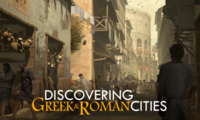More than 2.300 people have joined the second run of MOOC on ancient cities
On 2 April, the second run of the massive open online course “Discovering Greek & Roman Cities” kicked off. The course on ancient urbanism and urbanity is a collaboration between Aarhus University and five other European universities.

Due to Covid-19, the second run of the MOOC started earlier than initially planned, and the course reached many interested on social media through hashtags such as #LearnAtHome. More than 2.300 people are currently participating in week four of the eight-week long course “Discovering Greek & Roman Cities”. During these eight weeks, participants will be engaging with ancient Greek and Roman cities of different sizes and importance, with those who once inhabited these cities, with methods of urban archaeology, and with the heritage of ancient urbanism.
Teaching material from the MOOC available on YouTube
The MOOC consists of eight modules with video lectures, interviews with experts, quizzes, and assignments. These combined will shed light on ancient cities for students, scholars, stakeholders, and everyone else interested. In a time of rapid transitions and changes in teaching methods, however, all the video lectures have also been made available on YouTube under open Creative Commons licences in order to help colleagues in need of digital teaching material on ancient cities. Basic knowledge of chronology and historical development as well as an understanding of the diversity of the shared European heritage and the preservation of cultural heritage will be important objectives of learning.
A European cooperation on digital learning
Scholars from six European universities (Kiel University, Aarhus University, University of Athens, University of Bergen, University Paris I, and Open University of the Netherlands) have worked together to create this course. From the Danish National Research Foundation’s Centre for Urban Network Evolutions (UrbNet), centre director professor Rubina Raja and former assistant professor Michael Blömer have participated in developing the video-based and interactive MOOC. The latest research and state-of-the-art information on the topic is incorporated into the course that moves far beyond handbook knowledge.
Among the many Greek and Roman cities that will be explored, several UrbNet subprojects are represented when the course participants will engage with the mega city of Rome, the desert city of Palmyra in Syria, the Decapolis city of Jerash in Jordan, and Doliche in Turkey, home of the famous god Jupiter Dolichenus.
The Strategic Partnership “Ancient Cities” has been co-funded by the ERASMUS+ Programme of the European Union.
Read more and sign up for the MOOC here.
See the video lectures on YouTube here.
